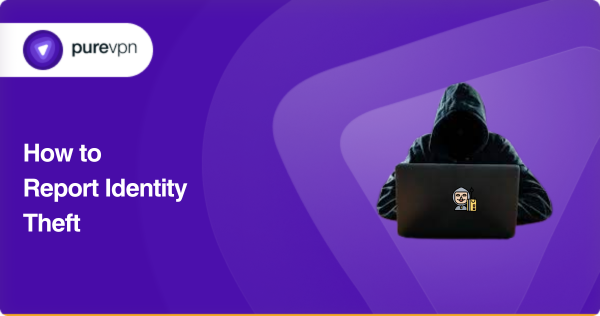Table of Contents
Picture this. You’re applying for your dream job, and you get called in for an interview.
Everything goes well, but then comes the dreaded news: your credit score is tanked, and they can’t hire you. Your dream job, poof! Vanished into thin air.
But the worst part? You’ve always taken care of your credit. It couldn’t be you who tanked your score. So, what happened?
Well, dear reader, this is a case of identity theft. And this is just one of many stories you’ll find on the internet concerning identity theft. But what is identity theft in the first place? The following guide is sure to answer your Question “How to report identity theft”?

Unmasking identity theft
The world of identity theft is no different than a really scary movie (in fact, some of the most creepy scary movies are based on identity theft). And just like in a scary movie, the right knowledge can become your best weapon in the fight against these invisible monsters.
Identity theft happens when someone, somewhere, somehow gets their dirty little hands on your personal or financial information and uses it to commit fraud. They would make purchases you never dreamed of buying or carry out transactions you never authorized.
The monsters who do identity theft have many faces and commit the crime in a multitude of ways. Some are so persistent, they would dive into dumpsters to fish out your bank statements or credit card bills. While the more dangerous ones employ high-tech strategies like hacking into databases to grab customer information.
No matter their method, they can damage your credit score, finances, and your reputation, often without you even realizing it.
The types of identity theft
Like veteran actors, identity thieves can wear many disguises. Here are a few roles they have been known to take on:
Financial identity thieves
These are con artists who use your identity to get credit, goods, services, or benefits. Financial identity theft is the most frequent type of identity theft.
Social security impostors
Once they get your Social Security Number, they use it to apply for credit cards and loans. And they don’t plan on paying back any of the balances. They can also use your number to receive various kinds of benefits.
Medical impersonators
In this case, the thief uses your details to get free medical care. You have to pay for the hospital bill, though.
Synthetic identity criminals
These sneaky thieves use a cunning mixture of real and fake information to create a new identity which they then use to open fraudulent accounts or make illegal purchases. Synthetic identity fraud has already cost businesses up to $2.5 billion in 2022 alone!
Child identity thieves
Thieves don’t have a conscience, so we can never be sure how low they may stoop for their gain. This is why identity thieves are known to even use a child’s identity for their gain, often to obtain a residence, find employment, or evade arrest.
Tax impersonators
Tax identity theft happens when someone uses your personal details, including your Social Security Number, to file a fraudulent tax return and then pocket the refund.
Criminal double
In criminal identity theft, the culprit pretends to be someone else when arrested so they can avoid legal consequences.
How to spot identity theft
Identity theft is incredibly notorious. It sneaks up on you, and you might not even know it’s happening until it’s too late. But there are a few red flags that should be able to make your Spidey senses tingle:
- You discover charges for items you didn’t buy on your credit card bill.
- Debt collectors start calling you about accounts you never opened.
- You don’t get a loan you applied for even when you thought your credit was golden.
- Your checks start bouncing left and right.
- Your utilities are mysteriously shut off.
- You can’t sign into any of your accounts.
- There are hard inquiries into your credit report that you didn’t cause.
- You receive new credit cards in the mail that you’ve never applied for.
Learn more: How to prevent identity theft?
How PureVPN helps protect your identity
Do you know what’s the most common method that hackers use to steal your identity? They hack into your phone or laptop whenever you connect your devices to a public WiFi hotspot.
Not sure how this works? Just watch the video below to get an idea:
As you can see from the video, cybercriminals use public WiFi to hack into your devices and steal your passwords. They then use this data to access your existing accounts or create new ones and perform identity theft. All this can be avoided once you arm yourself with PureVPN.
PureVPN works like an invisibility cloak for your online traffic. It uses the most advanced encryption technologies to hide your data, even if you’re connected to a compromised public WiFi network. So, while you’re scrolling through social media feeds on public Wi-Fi, PureVPN works behind the scenes to ensure your digital safety.
How to report identity theft
Dealing with identity theft might feel like trying to complete a jigsaw puzzle while blindfolded. But there are a few ways to put the pieces back together and report identity theft:
Lodge a complaint to the FTC
Immediately visit IdentityTheft.gov to lodge a report with the Federal Trade Commission. It’s the most important call for help you can make while dealing with the crisis.
Secure your credit
Lock down your credit reports immediately. Put fraud alerts in place and contact your banks to freeze your credit cards. This would put up a ‘Danger’ sign for all potential lenders and stop the thief from getting more loans in your name.
Have a chat with the banks
Get in touch with all the companies where you hold accounts, including your bank. Let them know you’re dealing with identity theft and request they freeze any compromised accounts.
Challenge inaccuracies
If you find any anomalies in your credit card reports or incorrect charges against you, don’t let them slide. Use your FTC report to dispute them immediately.
Start anew
Ask your bank and credit card companies to issue new cards. Also, make sure to update all of your account passwords, just like you’d change the locks after a break-in.
Wrapping up
We live in an age where our online presence is almost as vulnerable as our physical selves. It’s like virtual reality but with a bite as real as can be felt in the physical world. So, just like we secure our homes and possessions in the real world, we also need to secure our presence in the digital one.
Dealing with identity theft might feel like going through a nightmare, but it doesn’t mean you should always live in fear. The first step towards protection is to understand the threat. And you’ve already taken that step by reading through this guide.
The key is to stay vigilant, proactive, and informed. So, keep your online doors locked, and watch out for any suspicious signs. After all, forewarned is forearmed.
Frequently Asked Questions
We’ve already mentioned all the different ways in which identity thefts happen in the guide above. Out of all of them, the four most common ones include:
Financial identity theft: When someone uses your personal information to get access to your credit cards, goods, or services.
Medical identity theft: When someone uses your identity to claim free medical services or treatments.
Synthetic identity theft: When the thief combines real and fake information to create a new identity and uses that to make fraudulent purchases.
Child identity theft: When the thief uses a child’s identity for personal gains, like obtaining loans or dodging legal issues.
Absolutely, but it’s not as easy as you would probably think. Recovery from identity theft usually involves timely reporting the theft to the authorities, securing your credit by freezing your cards, disputing inaccuracies in your bills, and working closely with financial institutions to restore your standing.
As mentioned above, you should first report the crime to both: the Federal Trade Commission and your local law enforcement. Next, safeguard your credit by placing alerts and freezing your credit cards. Finally, contact all relevant companies and banks to inform them about identity theft.
It’s never easy to pinpoint the exact person who stole your identity. Even law enforcement agencies can get lost in this case. But looking at credit reports, bank statements, and medical records can provide clues that can help you with the case.
Theft generally means taking someone’s property without their consent, while identity theft refers to the stealing of personal information to impersonate another person, typically for financial gain.



